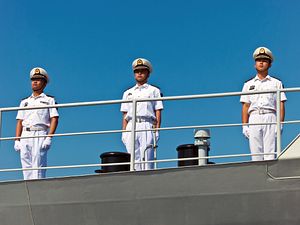The People’s Liberation Army Navy’s prompt evacuations of hundreds of Chinese and foreign nationals from the coast of troubled Yemen last week has demonstrated a more confident blue-water navy and given China a strategic win in a venue outside its traditional comfort zone.
The surprising move by a Chinese fleet on routine anti-piracy patrol assignments off Somali coast near the Gulf of Aden made for an interesting sidebar story to accompany heavy coverage of the ongoing crisis, with some quickly noticing its “unprecedented“ nature – pointing out that it was the first time China’s military had helped other countries evacuate their citizens during an international event.
The planning for the mission started a week before the final order was given on March 26, just as Saudi Arabia-led coalition forces started airstrikes against Iran-backed Houthi rebels inside Yemen, according to a memo obtained by a Chinese Navy reporter embedded with the operation.
The option to evacuate may in fact have been on the table as early as January, when Yemen accelerated its descent into chaos as Houthis took over the presidential palace in Sana’a, effectively seizing control of the capital and creating a political vacuum. The Chinese fleet – at the time still in Gulf of Aden – had been closely monitoring the fluid situation, the memo says.
With smooth evacuations of some 800 Chinese and foreigners from the port of Aden to the eastern African port of Djibouti, China demonstrated skill, quickly getting into and out of a touchy situation without the need to flash an aircraft carrier or killer anti-ship submarines. China clearly got that the operation was an act of military diplomacy.
The significance of the event also lies in its venue. In contrast to the United States, China has to date mostly been on the sidelines of the ongoing Middle East crisis, which with a nuclear Iran, raging Islamic Jihad hotbed, widening Arab Sunni/Shia divide, and stuttering Israel/Palestinian peace talks.
Indeed, some have argued that China – its rising superpower status notwithstanding – still operates a narrow-minded diplomacy driven by its economic interests and need for resources. Since the founding of the People’s Republic, the tone of China’s foreign policy has largely been set by flagship slogans championed by two legendary statesmen: ex-Premier Zhou Enlai and former strongman leader Deng Xiaoping.
Zhou’s “Five Principles of Peaceful Coexistence” – laid out in the 1950s – defined China’s diplomacy as that built on mutual respect for territorial rights and integrity, free from invasion and political interference, equal rights, and mutual benefits.
Deng’s approach 30 years later, at the dawn of China’s decades-long economic leap, was more abstract. His idea of “tao guang yang hui” – a Chinese idiom that literally translates as “to hide one’s talents, and bide one’s time for the right opportunity” – called on China to keep a soft, low-key diplomatic profile and prepare itself for future opportunities, whatever they might be.
Today, though, China is operating under a forceful leader who appears to have adopted an aggressive approach to foreign policy, the likes of which have not been seen in China for decades. But while China may have the ambition to carry its ambition beyond its traditional area of operations in the Western Pacific, and has for instance spent big on infrastructure in Africa and Latin America, its limitations are too obvious to ignore. Despite being a permanent member of the United Nations Security Council, China is inexperienced in brokering major peace negotiations or solving an ongoing conflict, which explains its reluctance to take part in Middle Eastern affairs. This will remain true for at least for the next decade.
The significance of the Chinese Navy’s evacuations is thus that it sends a message that China is starting to test the waters in a new arena, and it is willing to shoulder its responsibilities there. True, it’s far too early to assume that China is now a regional player in the Gulf – even militarily. For one thing, it’s navy is still not able to project power through forward deployment. Nonetheless, the Chinese move has had some ask whether the U.S. should have taken a more proactive role in evacuating its citizens and foreign nationals from the Yemen conflict. It’s a question that appeared to catch a State Department spokeswoman off guard.
It may also force the Obama administration to ask itself how prepared it is for a growing China presence in a region that has traditionally been at the core of U.S. foreign policy.
Kevin Wang is a researcher for CNN’s editorial oversight team in Atlanta. The views here are his own.
































